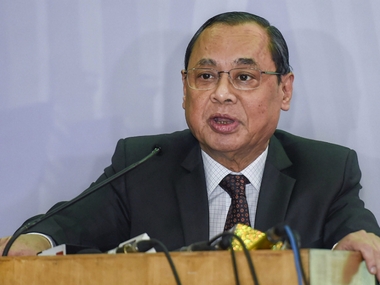A five-judge Constitution Bench of the Supreme Court headed by Chief Justice Ranjan Gogoi on Wednesday held that the office of the Chief Justice of India (CJI) should be under the ambit of the Right to Information (RTI) Act as it is a public office. However, the majority judgment of the constitution bench held that the judicial independence has to be kept in mind while dealing with transparency. “There needs to be a balance and the whole bulwark of upholding it is on the judiciary. The judiciary needs to be protected from such breach,” says Justice NV Ramana. The apex court also ruled that while a recommendation by the Collegium on names of judges can be disclosed, the reasons cannot come under the purview. The judgment was pronounced after the landmark verdict on 10 January, 2010, when the Delhi High Court had held that the office of the Chief Justice of India should come within the ambit of the RTI law, saying judicial independence was not a judge’s privilege, but a responsibility cast upon him. A five-judge constitution bench of Chief Justice Ranjan Gogoi and Justices NV Ramana, DY Chandrachud, Deepak Gupta and Sanjiv Khanna pronounced the judgment at 2 pm on Wednesday. The notice regarding the pronouncement of the judgement was made public on the apex court’s official website on Tuesday afternoon. [caption id=“attachment_6591391” align=“alignleft” width=“380”] File image of Ranjan Gogoi. News18[/caption] A five-judge constitution bench had on 4 April, 2019, reserved its verdict on the appeals filed in 2010 by the Supreme Court secretary general and its central public information officer against the Delhi High Court and the central information commission’s (CIC’s) orders. The bench, headed by the Chief Justice, had wrapped up the hearing saying nobody wants a “system of opaqueness”, but the judiciary cannot be destroyed in the name of transparency. “Nobody wants to remain in the state of darkness or keep anybody in the state of darkness,” it had said. “The question is drawing a line. In the name of transparency, you can’t destroy the institution.” The high court verdict was delivered by a three-judge bench comprising Chief Justice AP Shah and Justices Vikramjit Sen and S Muralidhar. The bench had dismissed a plea of the Supreme Court that contended bringing the CJI’s office within the RTI Act would “hamper” judicial independence. The move to bring the office of the CJI under the transparency law was initiated by RTI activist SC Agrawal. His lawyer Prashant Bhushan had submitted in the top court that though the apex court should not have been judging its own cause, it is hearing the appeals due to “doctrine of necessity”. The lawyer had described the reluctance of the judiciary in parting information under the RTI as “unfortunate” and “disturbing”, asking: “Do judges inhabit a different universe?” He had submitted that the apex court has always stood for transparency in functioning of other organs of State, but it develops cold feet when its own issues require attention. Referring to the RTI provisions, Bhushan had said they also deal with exemptions and information that cannot be given to applicants, but the public interest should always “outweigh” personal interests if the person concerned is holding or about to hold a public office. Dealing with “judicial independence”, he said the National Judicial Accountability Commission Act was struck down for protecting the judiciary against interference from the executive, but this did not mean that judiciary is free from “public scrutiny”. “This is not the independence from accountability. Independence of judiciary means it has to be independent from the executive and not independent from common public. People are entitled to know as to what public authorities are doing,” Bhushan had said. The deliberations of the Collegium in appointing and overlooking judges or lawyers should be made public and information can be parted with under RTI on case-to-case basis keeping in mind the larger public interest, the lawyer had said. The bench had said people, of late, were opting out and do not want to become judges because of the fear of negative publicity. “On interaction, the reason appears to be the possibility of the negative observations, whether rightly or wrongly, being brought into the public domain,” it had observed. In such a case, besides losing judgeship and reputation, the professional and family life of the person are adversely affected, it had said. The apex court had said it had brought about changes in the functioning of the collegium system and said now members have started interacting with prospective candidates. With inputs from PTI
The move to bring the office of the CJI under the transparency law was initiated by RTI activist SC Agrawal. His lawyer Prashant Bhushan had submitted in the top court that though the apex court should not have been judging its own cause, it is hearing the appeals due to “doctrine of necessity”.
Advertisement
End of Article


)

)
)
)
)
)
)
)
)



